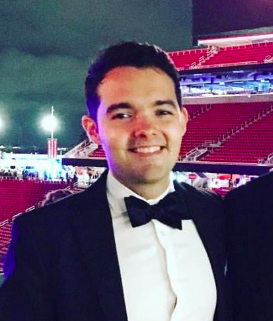KFC: You served as the Head Delegate of the Harvard Intercollegiate Model UN team during your time in college. What was the experience like leading one of the top teams in the nation?

Rodolfo Diaz at the Facebook holiday party
KFC: You’re working at the Facebook headquarters in Silicon Valley now. How were you able to leverage your Model UN experiences into a job in the tech world? What advice would you have for college students, particularly those in the social sciences, who’d like to pursue a career in tech?
Rodolfo: You don’t have to be a software engineer to work in tech. There are opportunities in operations, marketing, sales, policy, and other functions that don’t require a technical background. My advice is to ask friends at tech companies to connect you with co-workers in roles that interest you. That way you can understand if the day-to-day work interests you and identify the skills and experiences you’d need to get the job. Once you’ve done so, test out similar experiences through internships.
In terms of leveraging Model UN to land that tech job, it’s really all about the people you meet and friendships you make. The awesome network of friends I made through years of MUN competitions connected me with people in roles in tech that interested me and gave me amazing advice and tips on the application and interview process.
KFC: What’s the job of a Product Specialist at Facebook like? How have the skills you’ve developed in Model UN helped with your role?
Rodolfo: It’s honestly the most exciting opportunity I’ve had in my life. As a Product Specialist, I’m the expert in the user experience for my product—Facebook Groups—and using that knowledge I work with engineers to develop experiences that address our users’ top needs. Without knowing how to code I’m able to impact the day-to-day experience of the more than 1.6 billion people that use Facebook.
My Model UN skills help me be an effective Product Specialist in the following 3 ways:
- Communications: Speaking concisely and in simple terms make you a strong partner in roles where you work with cross functional partners that aren’t all always on the same page
- Empathy: Forming a coalition to draft that resolution really teaches you how to understand varying perspectives and how to work effectively with others
- Negotiation: Like in MUN, people in your teams will have varying points of views and learning how to help the team decide on the best path forward is a valuable skills
KFC: You did your Master’s at Cambridge on International Development. Now that you’re immersed in Silicon Valley, how do you think technology could better assist with international development?
Rodolfo: Technology’s role in is all about leveraging scale to connect people with information, partners, and opportunities they would otherwise not have access to. Here are three ways how:
- Education: Through online courses and just simple internet searches people can learn new skills to improve at their current job or engage in new lines of work. I for example used the website Khan Academy to teach myself statistics in preparation for an Econometrics course.
- Connecting to opportunities and business partners: Technology makes distance a non-issue when facilitating business opportunities. For example, conPRmetidos, a Puerto Rico-based nonprofit I advise, created an online platform that links Puerto Rican professionals on the island with mentors and investors in the mainland US. By creating this network it hopes to help local businesses by attracting investments to Puerto Rico and identifying business partners for to export of goods and services.
- Creating platforms to buy and sell goods: Technology platforms like Ebay, Airbnb, and Task Rabbit are powerful allies in development because they lend legitimacy to average people selling goods and services. Without this credibility, people like you and me wouldn’t feel comfortable giving our money to a person we don’t know.
**


